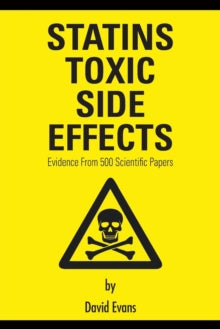
Statins Toxic Side Effects: Evidence from 500 Scientific Papers - David Evans
This book uses evidence from 500 scientific papers that show, incontrovertibly, that statins not only do not improve health but cause actual harm and should be avoided.
It shows the disturbing effects of statins on death rates, heart disease, stroke, diabetes and cancer. Statins are a health disaster for those with an under-active thyroid. It demonstrates how statins cause muscle disease, kidney disease, liver disease, pancreatitis and multi-organ failure. The dire consequences of statin use on the nervous system. Autoimmune diseases, arthritis and skin infections may result from statin use. Evidence is presented that reveal statins are deleterious for those that have asthma and lung diseases. Exercise performance is severely restricted by the use of the drug. People taking statins are found to have a 'foggy' brain, depression and an increased risk of violence and suicidal thoughts. Statins can damage your eyes and give you headaches. They can make men impotent, damage sperm quality and cause birth defects. Bowel problems, urinary tract infections and other general infections are exacerbated with statin use. Bone structure may be compromised and tendon rupture is more common when using the drug.
These 500 studies underline the judgement of the internationally renowned cardiologist, Dr Michel de Lorgeril, who said about statins: "We'll come to the inevitable conclusion in the end that these drugs are unnecessary and toxic, they must be removed from the market. "
Details Click to see more
This book has been written by our very own David Evans. He spent many painstaking hours researching scientific literature to produce this important book.
Review by Sally Fallon Morrel from Wise Traditions Magazine - Fall 2015:
David Evans has already given us two great compendiums:
- Low Cholesterol Leads to an Early Death: Evidence from 101 Scientific Papers, and
- Cholesterol and Saturated Fat Prevent Heart Disease: Evidence from 101 Scientific Papers.
His latest contribution, Statins Toxic Side Effects is a tour de force, a collection of five hundred studies showing that statin use is associated with greater risk of diabetes, cancer, muscle damage, hypothyroidism, organ failure, liver problems, pancreatitis, peripheral neuropathy, lupus, skin abnormalities, asthma, reduced lung function, reduced cognition, neurodegenerative diseases, depression, suicide, damaged eyes, impotence and birth defects. And if you think this is a good tradeoff for protection against heart disease, think again.Evans cites thirty-two studies showing that statins wont help with that either; they are associated with increased risk of serious adverse cardiovascular events, higher cardiac death rates, increased adverse events and death in those undergoing coronary artery bypass surgery, increased risk of death in angioplasty patients, increased risk of heart failure, and double the risk of death in patients with coronary artery disease. And just for good measure, case reports show that statins increase the risk of osteoarthritis and joint pain, cause both constipation and diarrhea, are associated with colitis, bone loss, tendon rupture, urinary track infectons and general infections including MRSA. The list of adverse conditions associated with low cholesterol is a long one, covering several pages.
If you have a loved one in the clutches of a statin-pushing cardiologist, this would be a good book to giveto both your loved one and the cardiologist. Maybe, just maybe, it will empower your friend or relative to stop taking these terrible drugs; and maybe, just maybe, it will give the cardiologist a twinge of conscience.
What about all those studies showing that statins save lives? Evans sums them up neatly with a chart showing virtual identical numbers of people alive in the treatment and control groups in the thirty-three major studies used to tout statins.
This article appeared in Wise Traditions in Food, Farming and the Healing Arts, the quarterly journal of the Weston A. Price Foundation, Fall 2015

